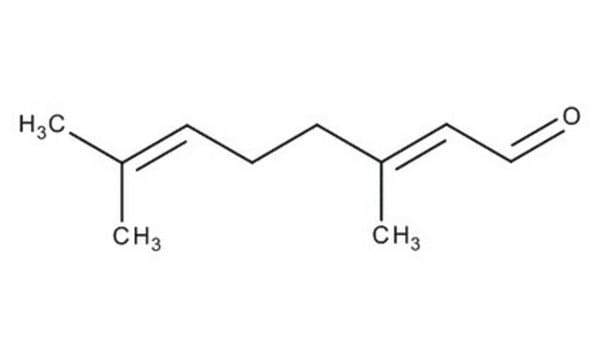W230316
Citral
natural, ≥96%, FCC, FG
Synonyme(s) :
3,7-Dimethyl-2,6-octadienal, Geranial and neral mixture
About This Item
Produits recommandés
Source biologique
Litsea cubeba Pers.
Niveau de qualité
Qualité
FG
Fragrance grade
Halal
Kosher
natural
Agence
follows IFRA guidelines
Conformité réglementaire
EU Regulation 1223/2009
EU Regulation 1334/2008 & 178/2002
FCC
FDA 21 CFR 117
Densité de vapeur
5 (vs air)
Pression de vapeur
0.2 mmHg ( 200 °C)
Pureté
≥96%
Composition
contains IFRA and EU 1223/2009 restricted Citral (Neral + Geranial)
Caractéristiques du produit alternatif plus écologique
Less Hazardous Chemical Syntheses
Use of Renewable Feedstocks
Learn more about the Principles of Green Chemistry.
Indice de réfraction
n20/D 1.488 (lit.)
Point d'ébullition
229 °C (lit.)
Densité
0.888 g/mL at 25 °C (lit.)
Application(s)
flavors and fragrances
Documentation
see Safety & Documentation for available documents
Allergène alimentaire
no known allergens
Allergène de parfum
citral (neral+geranial)
Autre catégorie plus écologique
Propriétés organoleptiques
fresh; lemon; sweet
Chaîne SMILES
[H]C(=O)C=C(C)CC\C=C(\C)C
InChI
1S/C10H16O/c1-9(2)5-4-6-10(3)7-8-11/h5,7-8H,4,6H2,1-3H3
Clé InChI
WTEVQBCEXWBHNA-UHFFFAOYSA-N
Vous recherchez des produits similaires ? Visite Guide de comparaison des produits
Description générale
Application
- Exploring the binding affinity and characteristics of DcitOBP9 in citrus psyllids.: This study delves into the interactions between DcitOBP9, a key odorant-binding protein, and citral in citrus psyllids, providing insights into pest behavior and potential targets for eco-friendly pest management strategies (Pei et al., 2024).
- Synergistic anti-virulence efficacy of citral and carvacrol against mixed vaginitis causing Candida albicans and Gardnerella vaginalis: An in vitro and in vivo study.: Demonstrates the combined use of citral and carvacrol as a potent anti-virulence strategy against pathogens in mixed vaginitis, showcasing a promising lead for non-antibiotic treatments (Jothi and Gowrishankar, 2024).
- Effect of polyethoxylated flavonoids (PMFs)-loaded citral and chitosan composite coatings on citrus preservation: From the perspective of fruit resistance.: Discusses innovative food preservation techniques using citral-infused coatings to enhance the storage life and quality of citrus fruits, addressing critical issues in food technology (Li et al., 2024).
- Synthesis, antifungal activity and action mechanism of novel citral amide derivatives against Rhizoctonia solani.: Explores the synthesis of citral derivatives for use as antifungal agents, offering new solutions for controlling fungal diseases in crops with potential applications in sustainable agriculture (Zhang et al., 2024).
Notes préparatoires
Mention d'avertissement
Warning
Mentions de danger
Conseils de prudence
Classification des risques
Eye Irrit. 2 - Skin Irrit. 2 - Skin Sens. 1
Code de la classe de stockage
10 - Combustible liquids
Classe de danger pour l'eau (WGK)
WGK 1
Point d'éclair (°F)
208.4 °F - DIN 51758
Point d'éclair (°C)
98 °C - DIN 51758
Équipement de protection individuelle
Eyeshields, Faceshields, Gloves, type ABEK (EN14387) respirator filter
Certificats d'analyse (COA)
Recherchez un Certificats d'analyse (COA) en saisissant le numéro de lot du produit. Les numéros de lot figurent sur l'étiquette du produit après les mots "Lot" ou "Batch".
Déjà en possession de ce produit ?
Retrouvez la documentation relative aux produits que vous avez récemment achetés dans la Bibliothèque de documents.
Les clients ont également consulté
Notre équipe de scientifiques dispose d'une expérience dans tous les secteurs de la recherche, notamment en sciences de la vie, science des matériaux, synthèse chimique, chromatographie, analyse et dans de nombreux autres domaines..
Contacter notre Service technique









